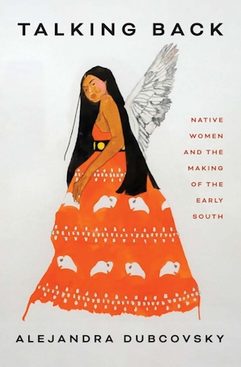Historian Alejandra Dubcovsky is the winner of the 2023 Emory Elliott Book Award for outstanding publications authored by faculty members in UC Riverside’s College of Humanities, Arts and Social Sciences, or CHASS.
Dubcovsky, a professor of history, was honored for her second book, “Talking Back: Native Women and the Making of the Early South,” published by Yale Press in 2023.
The book explores war, slavery, loss, and remembrance through the lives of Native, Spanish, and Black women in early American history in the South.
A UCR faculty member since 2016, Dubcovsky’s research focuses on Native American history, Spanish borderlands, and the early American South.
“I was so deeply honored to receive the Emory Eliott Award,” she said. “I had served on this book committee in the past and had been so impressed by the innovative and thoughtful work of my UCR colleagues. It feels wonderful (and surreal) to be part of this legacy.”
The Emory Elliott Book Award was established by the Center for Ideas and Society, or CIS, and the family and friends of Emory Elliott, a UCR professor of English who died in 2009. Each year, the committee chooses books published the previous academic year by CHASS faculty members who best exemplify Elliott’s values. The award comes with a $1,000 contribution towards the author’s research.
The center held a reception honoring Dubcovsky on April 29 at the Barn. Two finalists, Philipp Lehman, an associate professor of history, and Jennifer Syvertsen, an associate professor of anthropology, were also honored at the event.
Jeanette Kohl, CIS co-director, said members of the award advisory committee praised “Talking Back” as “groundbreaking, deeply human, and intellectually daring.”
“Alejandra writes powerful and beautiful books, always meticulously researched and thoroughly anchored in history, filled with a deeply human interest and bringing to light many surprises,” Kohl said.
Dylan Rodríguez, CIS co-director, said the book is part of a body of historical scholarship that crosses academic disciplinary and interdisciplinary fields.
“Alejandra’s work exemplifies a way of ‘doing history’ that expands and shatters traditional understandings of archive, academic method, and scholarly storytelling,” he said.
The book has won multiple awards since its publication. The Organization of American Historians selected the book for the 2024 Mary Nickliss Prize, recognizing the most original book by an academic historian in the field of U.S. women’s and/or gender history.
The organization described the book as “a pathbreaking, innovative, and generative book that reconfigures the empirical, conceptual, and methodological terrain of early American history.”
“With a deft hand, Dubcovsky tells how individual Native American, Black, and Spanish women—of varied origins, lineages, language groups, socioeconomic statuses, slave or free—carved out domestic and public lives in the colonial era," a news release announcing the award states. "In doing so, it recasts our understanding of women’s roles in early U.S. history and the gendered dynamics that shaped it.”
Dubcovsky also won the Rembert Patrick Award from the Florida Historical Society and the William L. Proctor Award from the Historic St. Augustine Research Institute in Florida.

